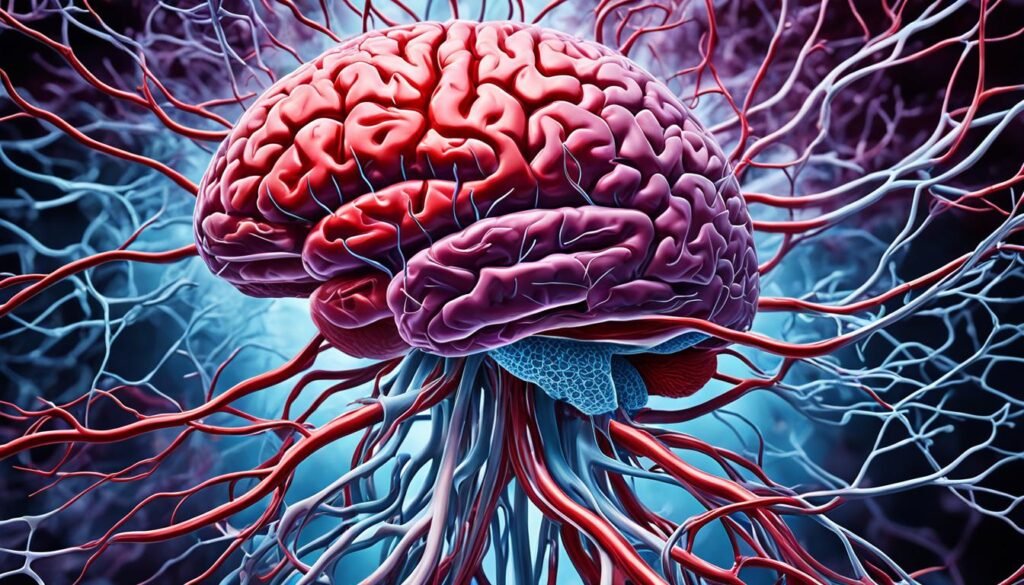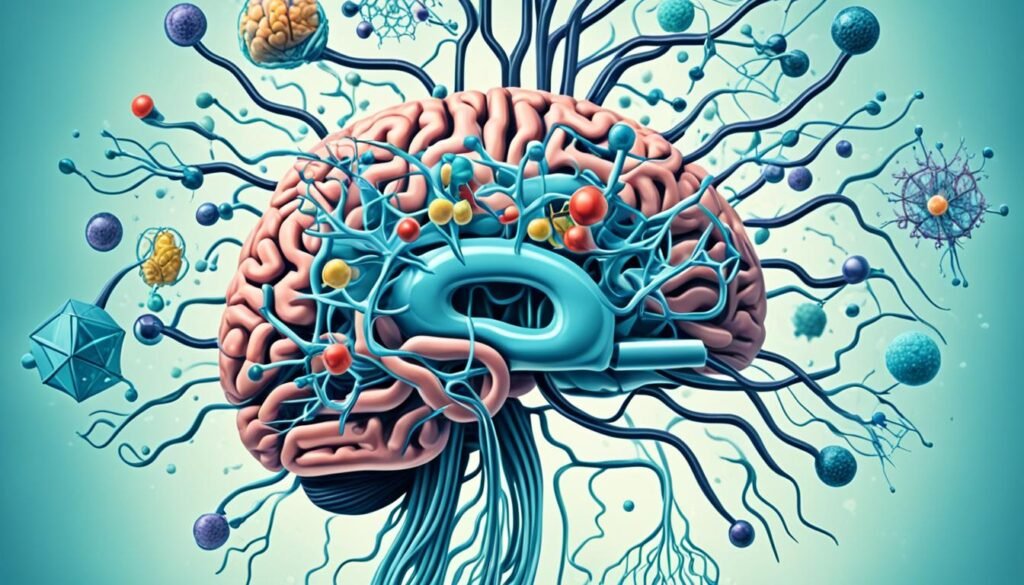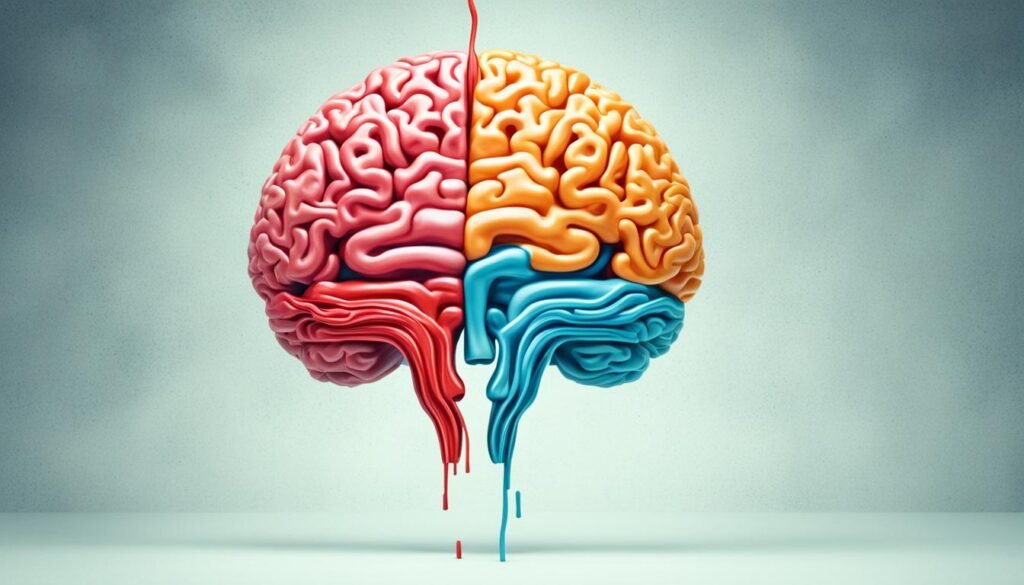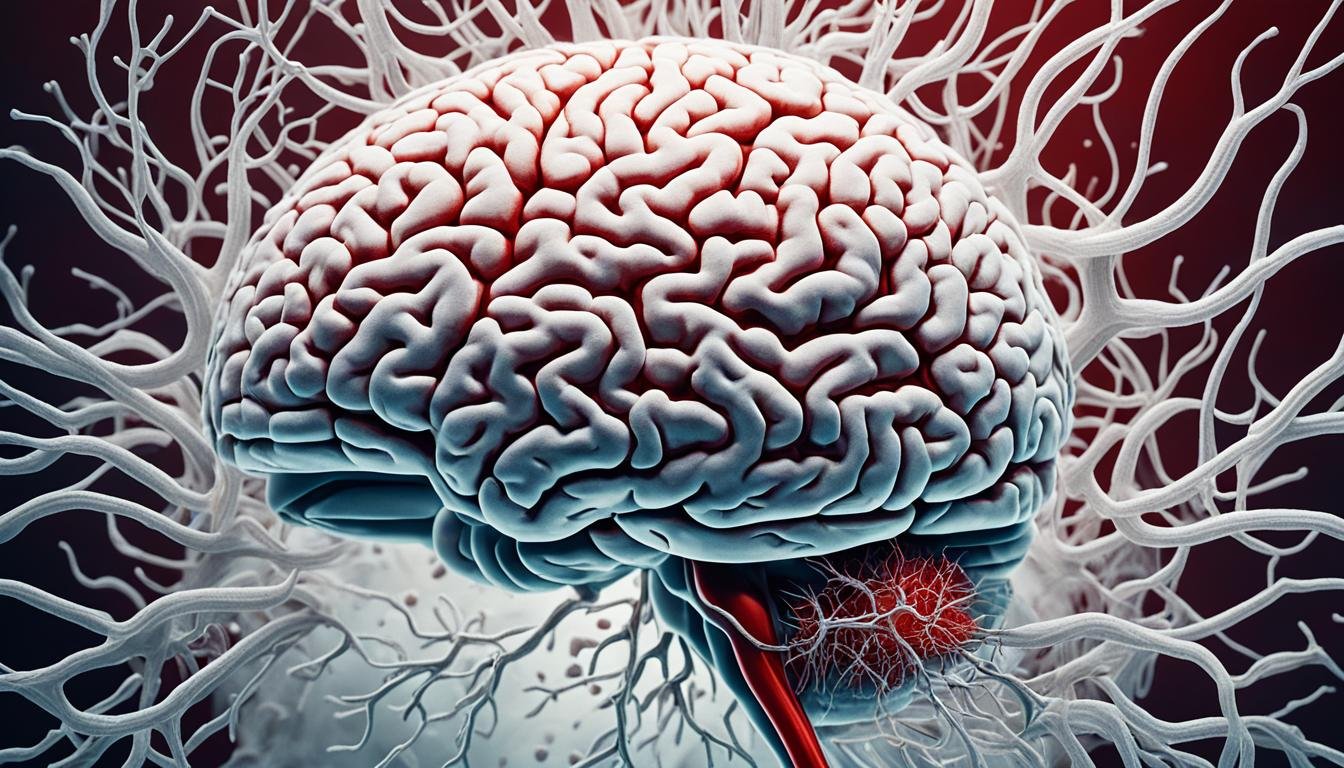MSG is a common food additive that makes our food taste better. But, it has led to many discussions about its safety. Some say it’s safe, while others believe it can harm us, especially our nervous system. It’s important to learn about the real effects of MSG on our bodies.
MSG is known as an excitotoxin. It can make brain cells so excited that they may die.1 This is worrying because MSG gets to the brain very quickly, even bypassing a protective barrier. It stays in the brain for up to 24 hours after we eat it. This long time can hurt brain cells and mess up important brain jobs, possibly causing health issues.
Key Takeaways
- MSG is a common food additive that can have detrimental effects on the nervous system.
- MSG is an excitotoxin that can damage brain cells and disrupt important brain functions.
- Consuming MSG can lead to a variety of health issues, including headaches, migraines, obesity, and hormonal imbalances.
- Many people may have a sensitivity to MSG, experiencing adverse reactions even in small amounts.
- Avoiding MSG in your diet by reading labels and choosing whole, unprocessed foods is the best way to minimize its potential risks.
As we learn more about MSG, it becomes clear that it’s a serious topic. We need to be careful. Knowing the risks and finding ways to avoid MSG can help us stay healthy. It seems smart to be cautious about MSG.
What is MSG?
Monosodium glutamate, or MSG, is a common food additive. It makes savory dishes tastier.2 This ingredient is in many processed foods. These include frozen dinners, salty snacks, and canned soups. MSG is also added in restaurants and fast food.
Understanding Monosodium Glutamate
For about 100 years, MSG has enhanced the flavor of foods.2 People usually have 0.3–1.0 grams of MSG daily.2 It’s considered safe by health experts.2 The safe daily amount is 14 mg per pound of body weight.2 But only about 1% of people are sensitive to it.2 For them, 3 grams of MSG may cause mild reactions.2
MSG as a Food Additive
Most MSG foods have less than half a gram of MSG.2 MSG is also in some natural foods. These include animal-based proteins, cheese, and vegetables. It’s in processed meats, sauces, dressings, and fast food too.2
Prevalence of MSG in Processed Foods
Since 1969, MSG has been debated. A study found it might harm mice. The U.S. FDA says it’s safe.3 There’s no strong proof that MSG causes symptoms, like headache or chest pain.3 However, some people might have mild reactions. These reactions usually stop without needing treatment. A few people have to avoid MSG foods to stay clear of these effects.3
The Shocking Truth About MSG
MSG is found in many foods to make them taste better, but it can harm our brain cells. It’s known as an excitotoxin because it can overstimulate brain cells until they die.4 The brain’s protector, the blood-brain barrier, works hard to keep our brain safe. But with MSG, it can’t always do its job perfectly.4
MSG and the Blood-Brain Barrier
Even a tiny change in chemical levels can mess up how our brain works. Excitotoxins like MSG are especially bad. They can sneak past the blood-brain barrier and stick around in the brain for a full day.4 This can hurt brain cells and mess with how our brain functions.
Excitotoxins and Brain Cell Damage
MSG can actually overexcite brain cells until they die.4 This is a very big deal for the brain, and it might cause issues with memory and thinking.

Potential Health Risks of MSG
Monosodium glutamate (MSG) might cause health worries like headaches and weight gain. It can also mess up hormonal balance and digestive health.3
Someone might notice MSG’s bad effects within 48 hours, even if they eat just a bit. This can make finding the cause of the reaction hard. The symptoms can be headaches, hives, or even panic attacks.3
For those with certain brain issues or a family history of brain disease, MSG may be worse.3
Headaches and Migraines
Many people say MSG gives them headaches and migraines.3 Why this happens is not clear. But, some think MSG gets into the brain and acts as an excitotoxin, affecting the brain’s signaling.3
Obesity and Weight Gain
There’s new info that combining MSG and eating a lot might lead to obesity.5 A 2011 study in China found higher MSG eaters were often overweight.5 And a review in 2017 mentioned MSG might have mixed effects on our health, possibly linking to metabolic issues.5
Hormonal Imbalances
MSG could also mess up our hormones.5 In 2015, a study showed male rats had lower sperm count and testosterone after eating MSG. Their testicles were also affected.5
Digestive Issues
Aside from the brain and weight effects, MSG can cause tummy problems too.3 People might feel sick or bloated after eating it.3
MSG Sensitivity and Allergic Reactions
Some people may react poorly to MSG. In a study, many who were sensitive felt bad after 5 grams of MSG. Yet more felt sick just from the thought, not the real MSG.3 So if MSG makes you feel bad, try not to eat it.
The FDA thinks MSG is usually okay to eat.3 But, they get lots of reports about folks getting sick from it. These reports talk about a lot of signs, like head pain and feeling your face get tight.3 Still, it’s not totally clear if MSG causes these issues for sure. If you do feel bad from MSG, the signs are usually not serious.3 This means just staying away from foods with MSG can help not get sick.
Even though the FDA says MSG is okay, some might still react poorly to it. It’s vital to listen to your body and skip MSG if it makes you feel sick. By being smart about your food choices, you can lower the chance of facing issues with this ingredient.

Is MSG Bad for You? The Evidence
Some evidence shows that MSG might hurt our brains and how we digest food. Researchers aren’t completely sure about it.3 A few studies say MSG can go into our brains, miss a protective barrier, and harm our brain cells.6 Others show it probably doesn’t harm our brains because it can’t pass the barrier.3
Research on MSG and Brain Health
Some studies connect eating MSG to getting heavier and having problems with how we process food.2 But, some research hasn’t found this link.2 So, the debate on MSG’s safety continues.6
Studies on MSG and Metabolic Disorders
In European countries, people usually consume 0.3–1.0 g of MSG a day.6 This is in line with the safe daily amount set by the European Food Safety Authority (EFSA).6 Yet, some worry about MSG after eating it for a long time, even though food regulators say it’s okay.6
The argument over MSG safety goes on. Some research says it may harm our nerves, heart, liver, and kidneys.6 But, other studies find mistakes in these earlier tests, raising doubts about the harm.6

Identifying Hidden Sources of MSG
MSG is harmful even if called something else.7 Many think it’s only in Chinese food. But, it’s in lots of processed and packed foods too.7 Sometimes, it’s not on the label. Instead, it’s called by other names like hydrolyzed vegetable protein or yeast extract.7 Be careful with processed and fast foods to avoid MSG.
Alternative Names for MSG
To stay safe, know the different names for MSG on food labels.7 Some common ones are hydrolyzed protein or plant protein extract.7 Watch out for these names to eat healthier.
Common Foods Containing MSG
MSG isn’t just in Chinese dishes.7 It’s also in many processed foods. This includes frozen meals, chips, and some soups.7 Beware, fast foods often have MSG too, hidden under different names.7 Read labels carefully and pick whole foods to dodge hidden MSG.

| Ingredient | Description |
|---|---|
| Hydrolyzed Vegetable Protein | A source of free glutamic acid, which is chemically similar to MSG. |
| Yeast Extract | Also contains free glutamic acid, which can have the same effects as MSG. |
| Soy Sauce | Contains MSG or glutamic acid that is released during the fermentation process. |
| Bouillon and Broth | Often contain MSG or other ingredients that are high in glutamic acid. |
| Anything Labeled “Flavors” or “Flavorings” | May contain MSG or other ingredient sources of free glutamic acid. |
Avoiding MSG in Your Diet
To keep away from possible health dangers from MSG2, read labels well and pick whole, natural foods as much as you can8. Stay away from ready-to-eat or processed foods8 and be careful with fast food joints as they often add MSG2. If a product doesn’t show its ingredients, it might have MSG. Also, learn the different names MSG hides behind3. Keep an eye out for these names and choose whole foods to avoid them.
Reading Food Labels Carefully
Being careful about MSG means checking food labels well8. Look out for names like hydrolyzed vegetable protein and yeast extract8. These are just fancy names for MSG. By reading the labels and avoiding these, you can cut down on your MSG intake2. Then, you might stay away from health concerns linked to MSG.
Choosing Whole, Unprocessed Foods
To steer clear of MSG, go for whole, natural foods8. Choose fresh fruits, veggies, whole grains, and lean meats over processed meals8. This choice greatly lowers your MSG exposure. It keeps your diet free of MSG and other bad extras2.
The Controversy Surrounding MSG
The safety of monosodium glutamate (MSG) has sparked much debate over the years. Some studies suggest MSG could harm the brain and metabolism,2 but other research says it’s likely safe when used in small amounts.3 These mixed findings cause ongoing arguments about MSG’s risks and benefits.
Conflicting Studies and Opinions
Conflicting studies make the MSG debate complex. Some claim MSG leads to issues like headaches, obesity, and brain problems.2 Yet, other research doesn’t find solid proof of these claims.3 This situation makes it hard for officials to set clear rules on MSG as a food additive.
Regulations and Guidelines
Setting clear rules on MSG has proved difficult for regulatory bodies. The U.S. FDA sees MSG as safe for most people,3 but they’ve gotten reports of bad reactions to it.3 Global organizations also consider MSG safe,9 but the debate persists and worries consumers and health pros.
One issue is that MSG hides in many processed foods under different names,9 making it tough for those sensitive to it. Since MSG is so common, the debate keeps going with new studies and talks about this ingredient.

Conclusion
Is MSG safe to eat? The evidence is mixed. Some studies say MSG can cause headaches, obesity, and hormone issues10. But other research shows it’s safe for most people when eaten in small amounts6.
Feel bad after eating MSG? Then stay away from it. Try to eat less processed food and choose whole foods without MSG.
MSG is still debated. But knowing what we eat and making smart food choices is key10. MSG has less sodium than salt and is approved by some experts10.
The choice to eat MSG is yours. Listen to your body and pick what’s right for you. Stay informed and make wise food decisions. This helps us all be healthier and support better food practices.
FAQ
What is monosodium glutamate (MSG)?
Is MSG bad for your health?
What are the potential health risks of consuming MSG?
How can I avoid MSG in my diet?
What is the controversy surrounding the safety of MSG?
Source Links
- https://www.ecowatch.com/msg-health-effects-2182662411.html
- https://www.healthline.com/nutrition/msg-good-or-bad
- https://www.mayoclinic.org/healthy-lifestyle/nutrition-and-healthy-eating/expert-answers/monosodium-glutamate/faq-20058196
- https://www.today.com/health/msg-bad-you-truth-about-msg-according-experts-t197207
- https://www.ncbi.nlm.nih.gov/pmc/articles/PMC5938543/
- https://www.ncbi.nlm.nih.gov/pmc/articles/PMC6952072/
- https://www.hungryforchange.tv/article/sneaky-names-for-msg-check-your-labels
- https://www.webmd.com/diet/foods-high-in-msg
- https://health.clevelandclinic.org/is-msg-really-harmful
- https://www.plantoeat.com/blog/2024/06/is-msg-bad-for-you/

